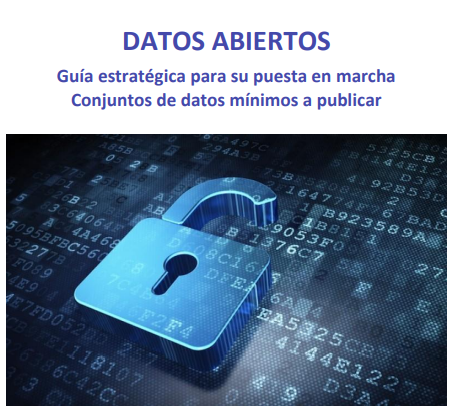These are the 80 datasets that the FEMP recommends to make available to the public
Fecha de la noticia: 05-05-2025

The publication of open data is a practice that drives technological development, benefits the business sector, and informs citizens. However, there are still some institutions that do not publish their data in open format, either because they lack the means or the necessary guidance to do so.
To solve this problem, in a firm commitment to transparency and the reuse of public information, the Spanish Federation of Municipalities and Provinces (FEMP) has created a list that serves as a guide to take the first steps in open data that can also serve as a reference for the different local entities.. The idea is to complement the catalogues of published datasets and try to get at least these datasets published. The reason? As the FEMP points out, "the fact that all local administrations publish sets of data on a specific topic generates synergies and opportunities for products and services, which can be replicated in different entities".
In 2017, the FEMP published a first list of 20 recommended datasets, rising to 40 in 2019 and reaching the current 80 that were submitted in 2023.
The FEMP's 80 outstanding datasets can now be consulted on a website that gathers detailed information, and a document summarising the information. In this post, we analyse its content and recommendations.
Evolution of municipal open data engagement
Over the last few years, the Spanish Federation of Municipalities and Provinces has been expanding the list of open data to be published by local entities. This expansion reflects not only the increasing maturity of local administrations in their capacity to manage and publish data, but also the increasing demand by citizens, businesses and other social agents for useful and reusable information to develop services, research or simply to better understand their urban environment.
The 80 recommended datasets, covering almost all areas of local management, are presented, structured in categories that respond to the most relevant information needs of citizens:
-
Urban planning and public space
Among the priority data, it is recommended to publish information on general urban development plans, urban planning licences, technical inspection of buildings, street maps, cartographic representations of natural spaces, monuments and inventory of immovable property, etc.
-
Transport
This category refers to datasets about public transport, cycle lanes, public car parks (including those for people with reduced mobility), electric vehicle charging points, loading and unloading zones, traffic and accidents.
-
Environment
In this sector, the FEMP recommends publishing data on air and water quality, meteorological data, noise pollution, trees, parks and gardens, waste management, clean points, recycling containers, natural spaces and risk areas.
-
Public Sector
Here the publication of budget data, subsidies, procurement, average supplier payment period, public debt, regulations, transparency obligations and administrative procedures is recommended.
-
Demography and society
Data is collected on the municipal census, unemployment and employment, social aid, assistance services for people in need, census of associations and municipal facilities (educational, health, sports).
-
Tourism and culture
We found datasets on tourist accommodation, tourist flows, places of interest, cultural agenda and events.
The FEMP not only recommends what dataset to make available to citizens, but also offers guidance and good practices to carry out this task. Through the web, various information on each dataset is easily accessible:
- Your description.
- If available, recommended vocabularies to ensure interoperability.
- Whether they are high value sets (and the subcategory to which they belong).
- Recommended minimum refresh rate.
- File formats in which it is recommended to have the information.
- Examples of bodies that have already opened such a dataset, for reference.
- Some examples of visualisations that have been made with such open data.
- Etc.
Materials for data management and openness
To facilitate this opening-up process, local authorities have a number of resources at their disposal. Among others:
- The Standard Ordinance on Data Governance in the local entity, developed by the Open Data Group of the FEMP Network, which provides a common legal framework for the process of data openness and data management.
- Templates and guidance for the formulation of the RISP (Re-use of Public Sector Information) Plan, including key issues for developing an open data initiative.
- Guide for the deployment of data portals, a monographic report that compiles best practices and recommendations for developing and maintaining data portals in municipalities.
Challenges and next steps
Despite progress, the full implementation of these 80 datasets is a challenge for many municipalities, especially smaller ones, which may face technical or resource difficulties in publishing them.
Therefore, the continuous support of supra-municipal bodies such as provincial councils, autonomous communities and the FEMP itself is essential, as well as inter-municipal collaboration to share good practices, tools and technological solutions.
The extension to 80 priority datasets marks a milestone on the road to a data-driven governance model, where public information is transformed into a common good that generates value for both administrations and society as a whole.
We encourage you to consult the new project website and to progressively incorporate these datasets into your municipal portals, thus contributing to the construction of a more complete open data ecosystem, useful and transformative for our cities.














